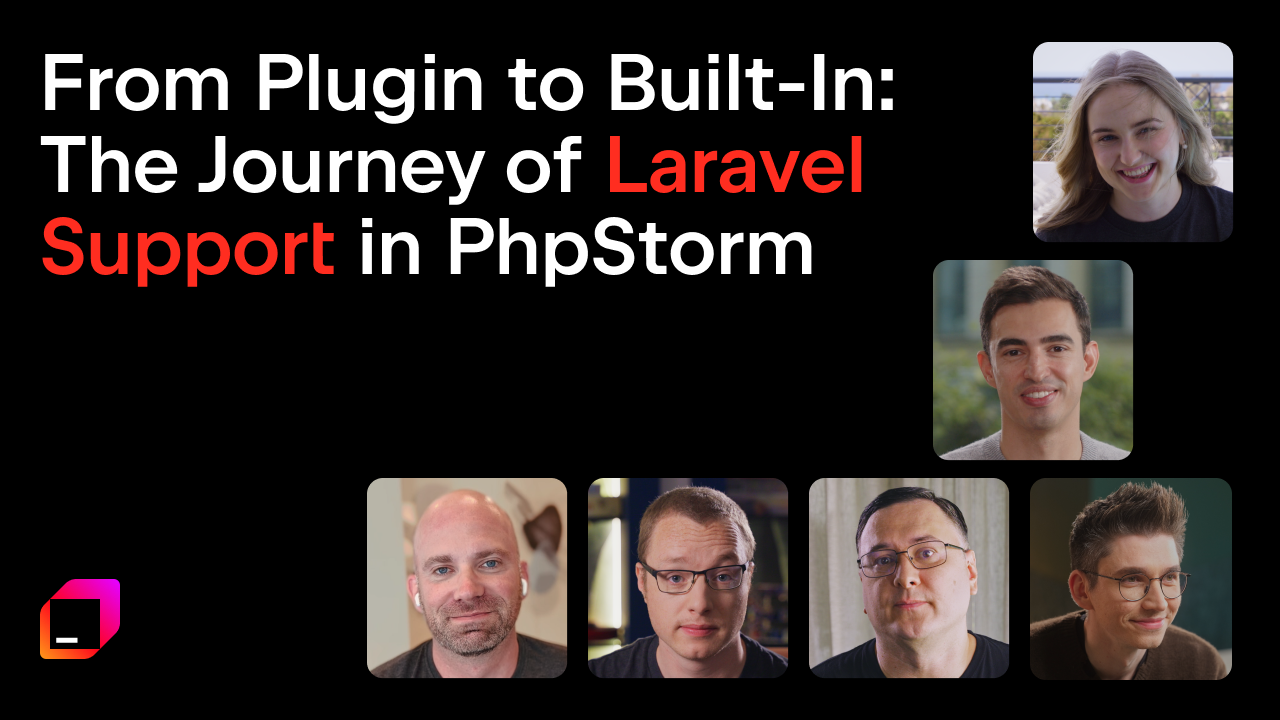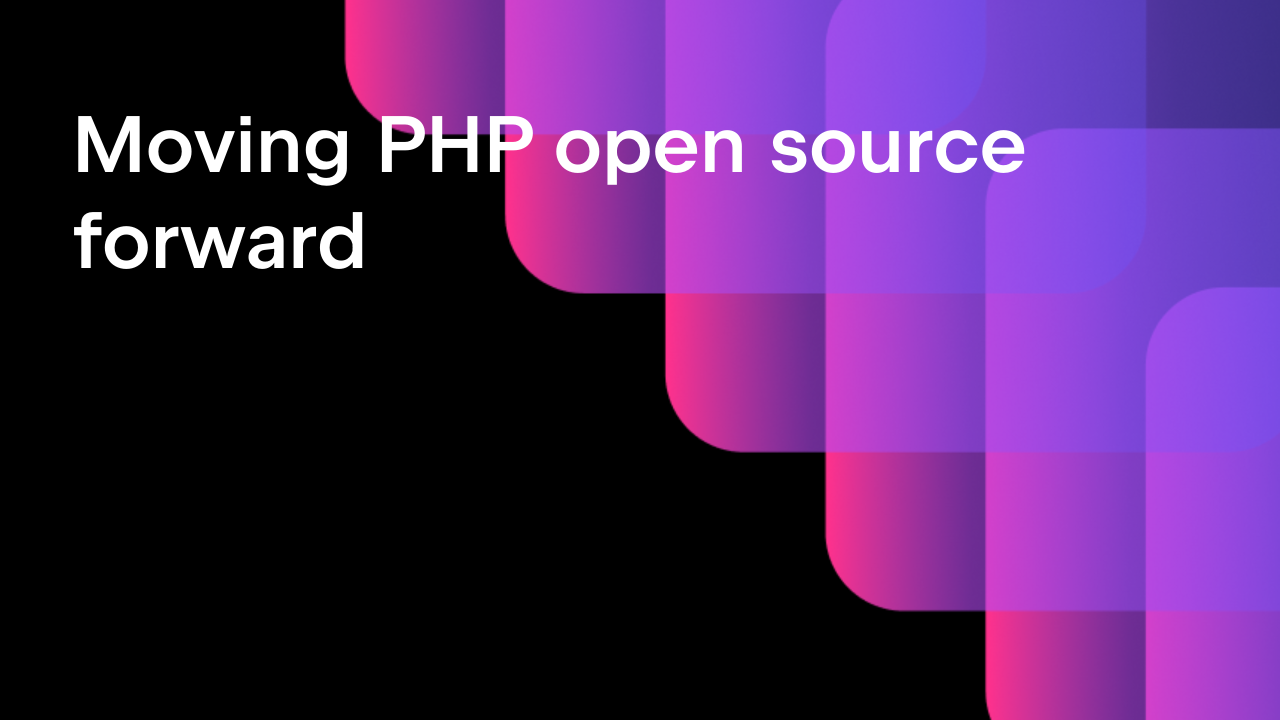The State of PHP 2025
The State of PHP 2025 examines how developers use, prefer, and rely on PHP, showing how this long-standing web language continues to modernize through new frameworks, improved tooling, and AI-assisted workflows.
In this report, we present findings from the Developer Ecosystem Survey 2025. Alongside the numbers, you’ll also hear commentary from Brent Roose, JetBrains Developer Advocate for PHP, and insights from other community experts explaining what’s shaping PHP today and where the ecosystem is heading.
If you’d like to see what the ecosystem looked like just a year ago, check out the State of PHP 2024.
Participants
This year, we collected responses from 1,720 developers who indicated PHP as their main programming language, with the largest populations living in Japan, the United States, Russia, China, and France.
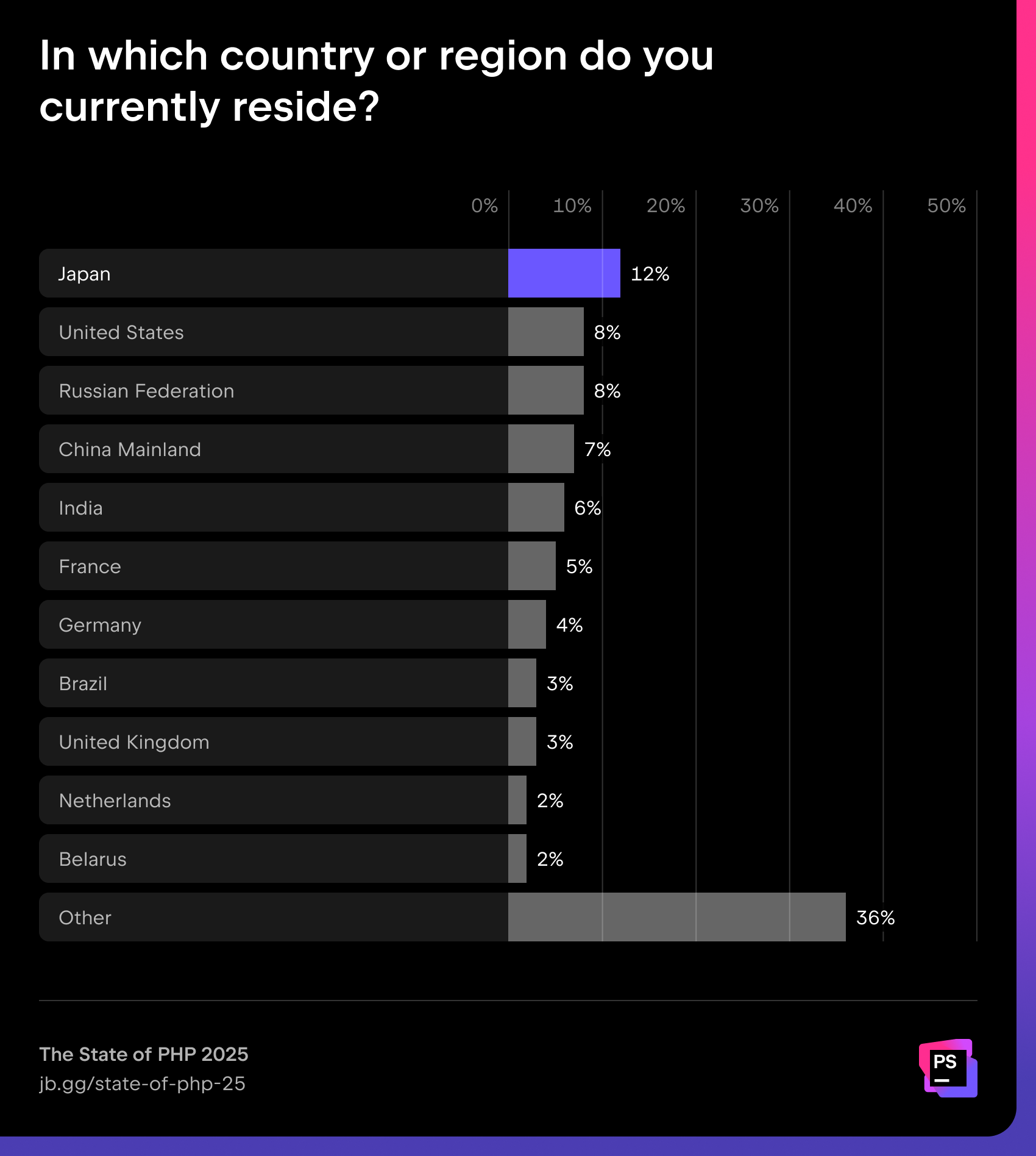
88% of PHP developers have more than three years of experience, with the largest single group falling in the six-to-ten-year range.
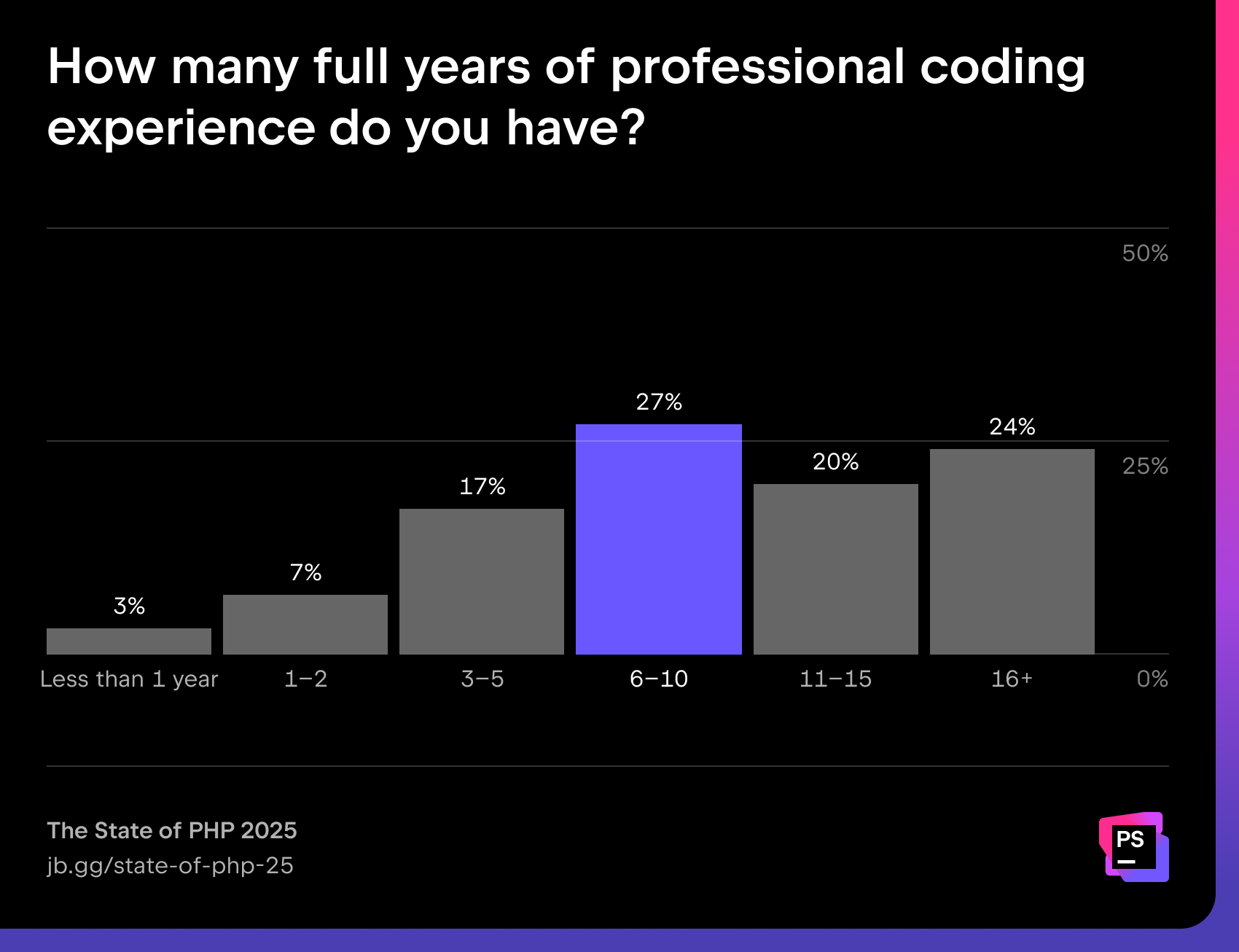
Team size and work environment
More than half of PHP developers (56%) work in small teams of two to seven people, while 12% work independently.
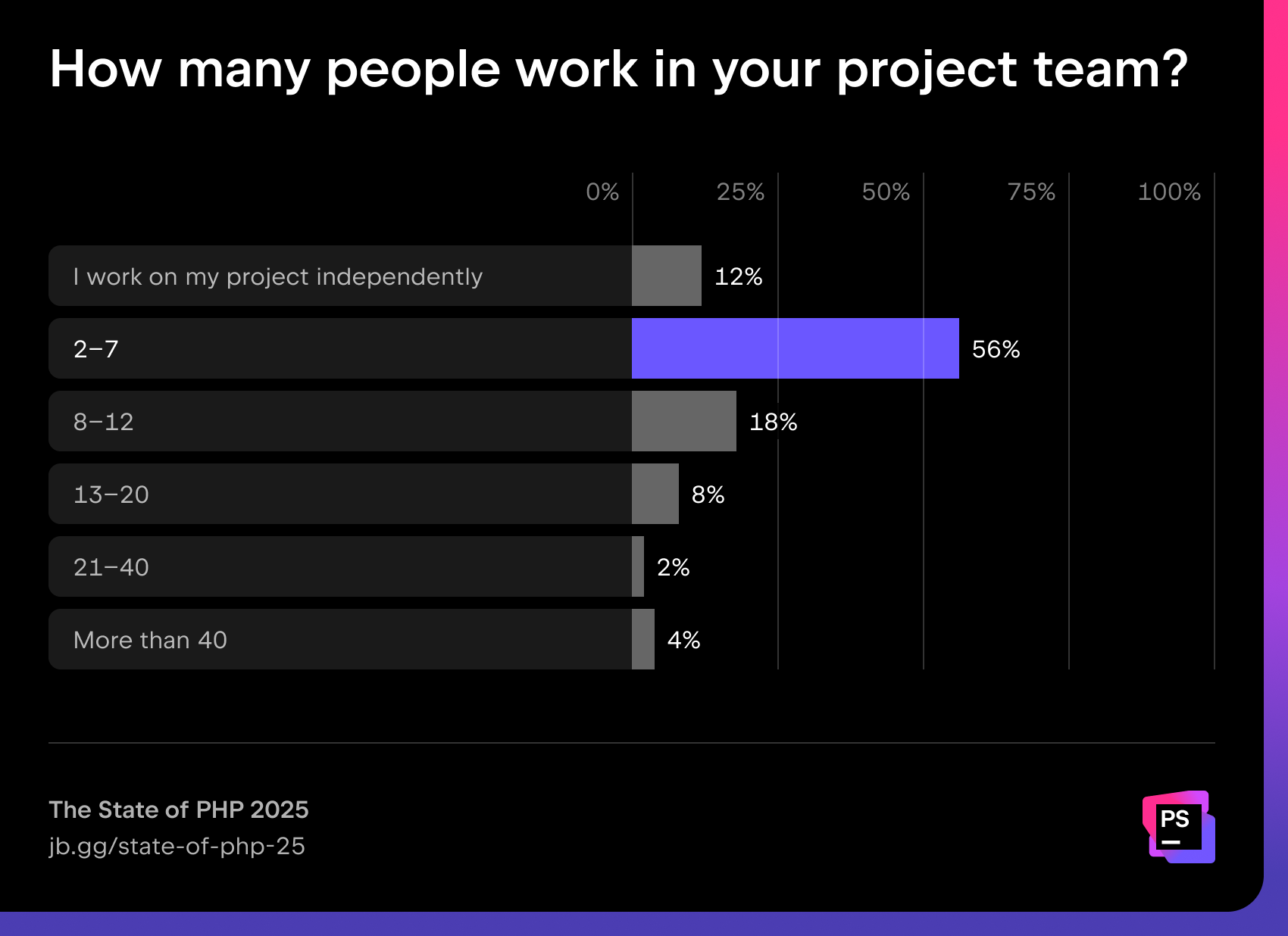
Language adoption and usage
The majority of PHP developers (58%) do not plan to migrate to other languages in the next year. For those who do, Go and Python are the most attractive alternatives.
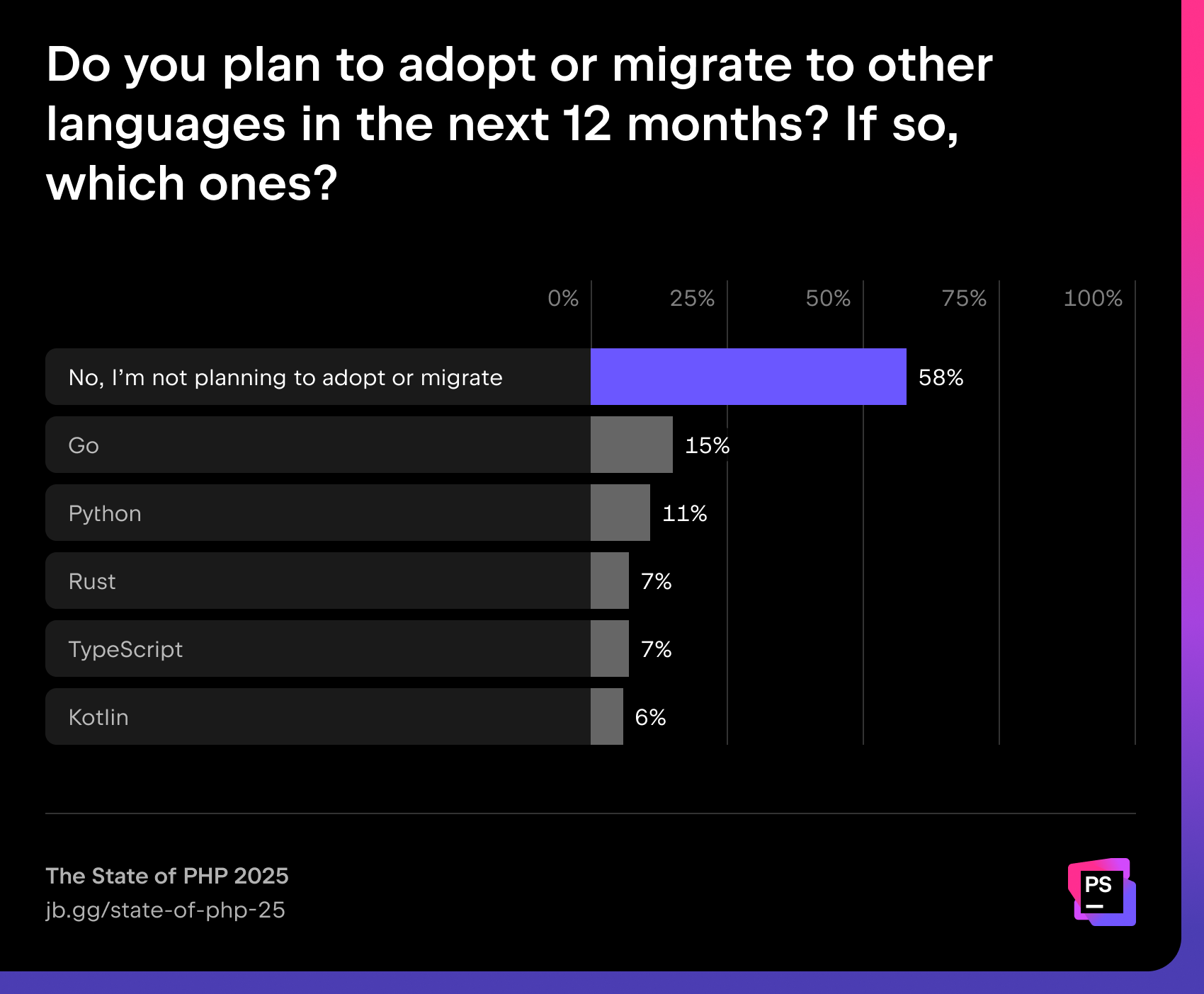
The share of newcomers is slowly growing: 4% have been using PHP for less than six months (up from 2% last year), and 6% for less than one year. Still, almost three-quarters (72%) of developers report over four years of PHP usage, underlining the ecosystem’s maturity.
“Important to note is that these numbers aren’t talking about people leaving PHP – they are about adopting languages besides PHP. I think it’s great to see so many PHP developers who are adding other languages to their toolbelt. PHP has areas where it shines, but there are also problems that are better solved with languages like Go or Rust. Working together across those language barriers leads to great results.”
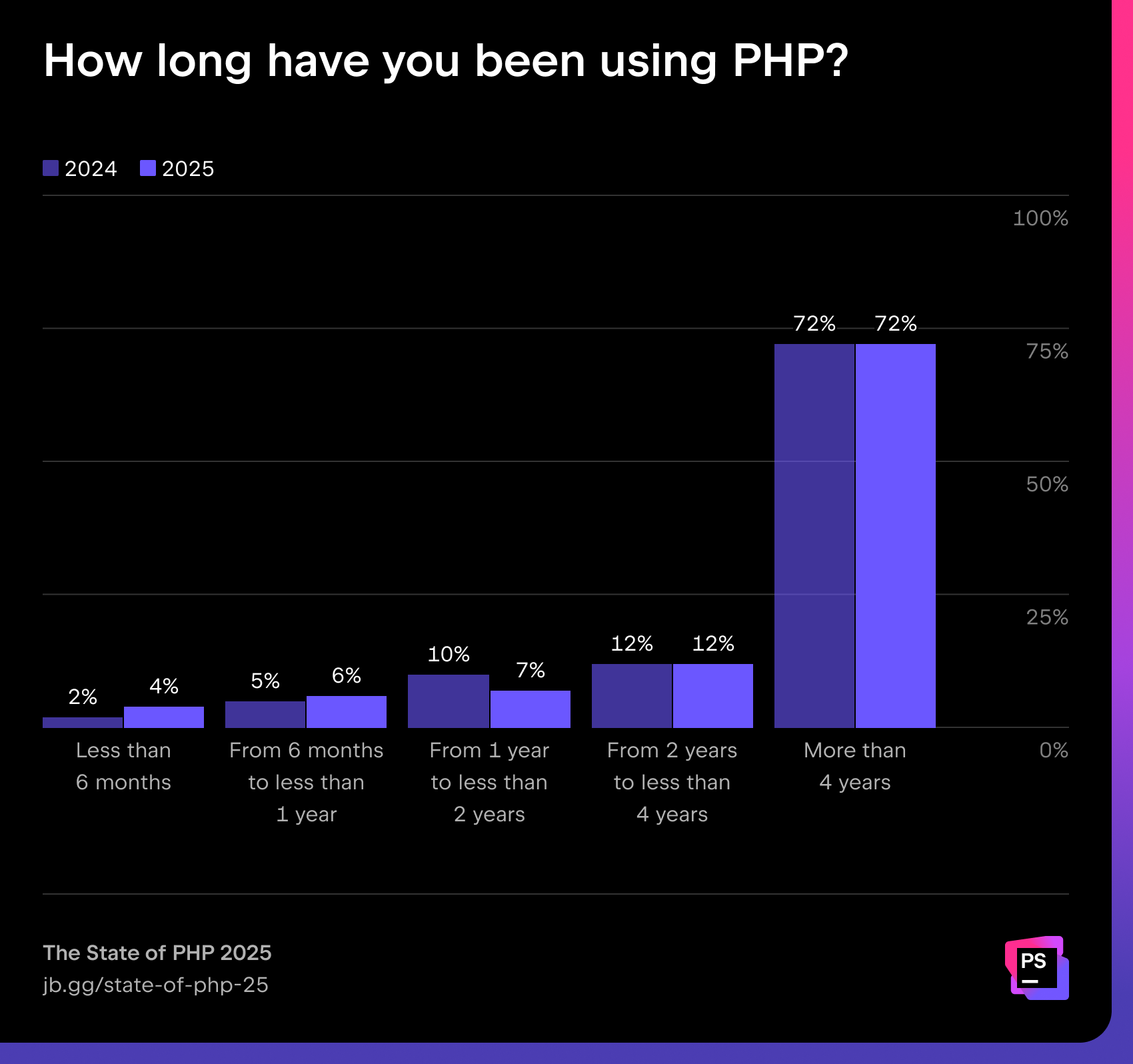
“It’s great to see more newcomers in PHP. It’s not surprising given the amount of positive buzz around PHP for the past couple of years, but it’s nice to see the numbers proving this trend as well.”
The trend toward modernization continues: PHP 8.x dominates with 89% usage, while PHP 7.x has dropped to 33%. Legacy versions (5.6 and earlier) are now down to 8%, though not entirely gone. Read Brent’s blog post for a more in-depth analysis of PHP versions’ usage.
“I think the open-source community plays a vital role in pushing the PHP community forward to adopt more secure and performant versions. The best part is that by using tools like Rector, upgrading becomes almost trivial. I speak from experience: The yearly upgrade is so well worth it.”
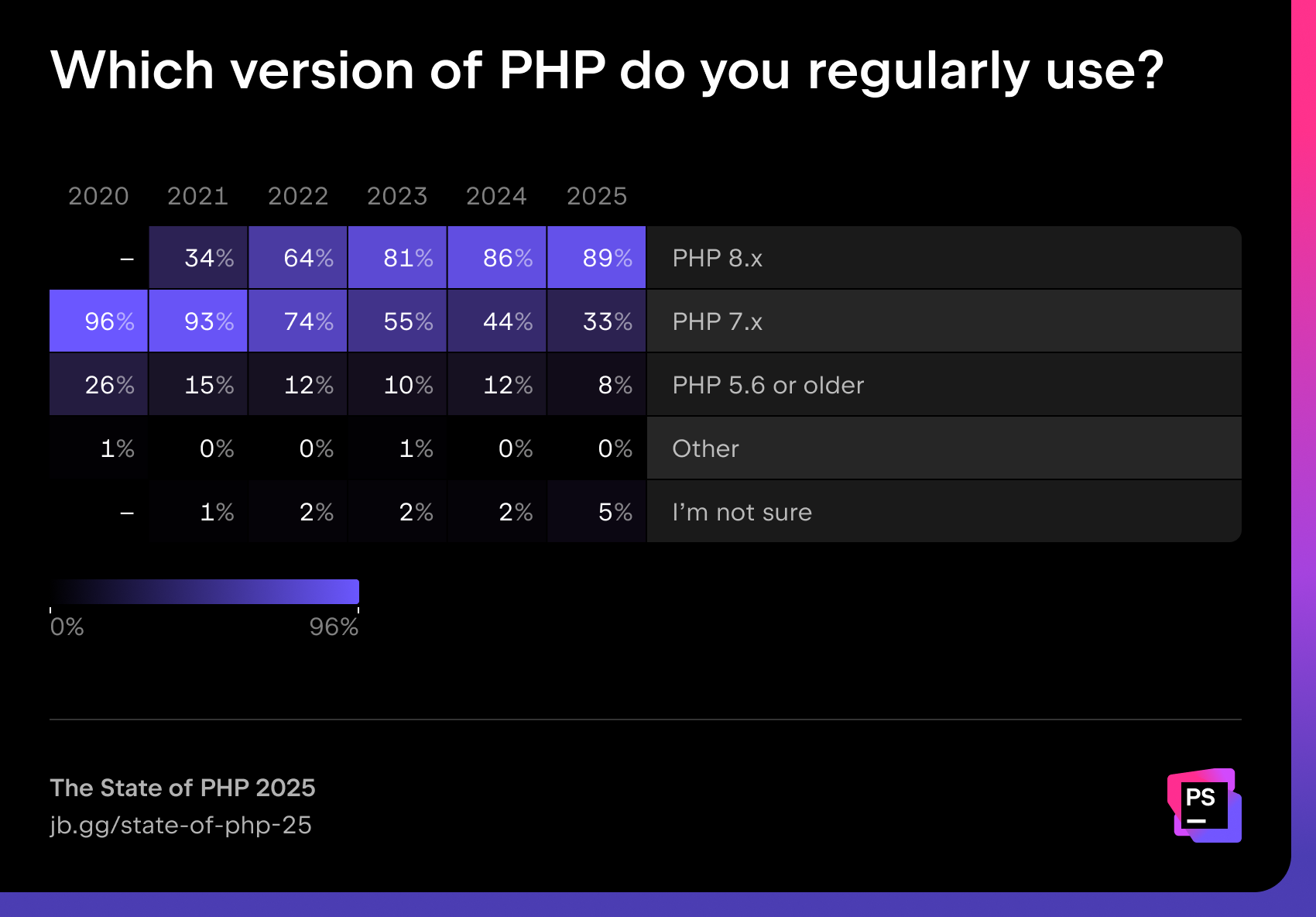
PHP frameworks and CMSs
No major shifts occurred in framework adoption: Laravel continues to lead with 64% usage, followed by WordPress (25%) and Symfony (23%). Other frameworks like CodeIgniter, Yii, and CakePHP hold smaller but stable shares.
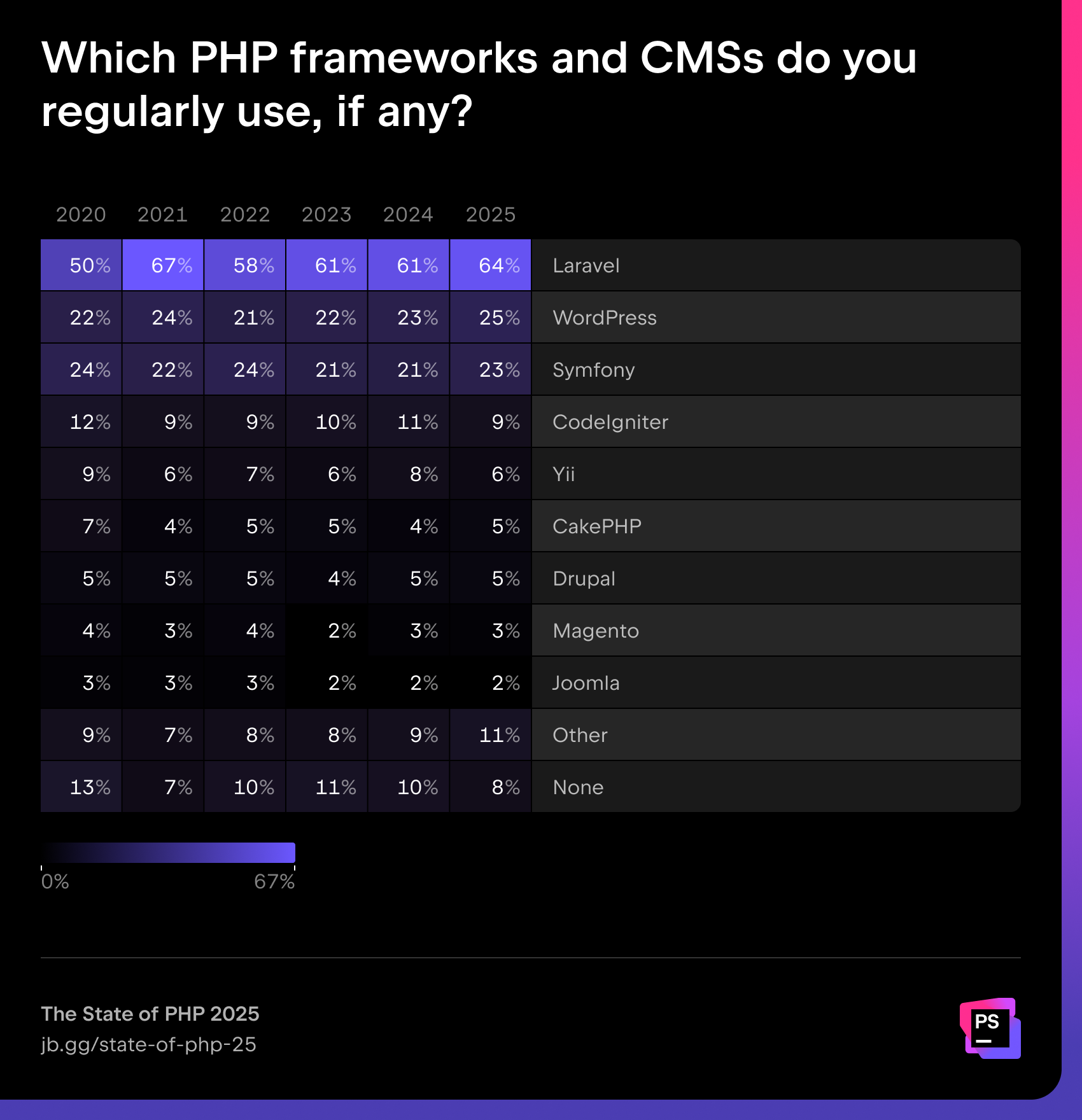
“We’re thrilled to see Laravel adoption continuing to grow, driven by innovations like Laravel Cloud and AI integrations such as Laravel Boost and MCP. Laravel remains focused on providing a comprehensive, modern full-stack solution that makes PHP development more productive and accessible than ever.”
“Symfony contributors continue to push the boundaries of what can be expressed through type annotations, creating a virtuous cycle where codebases, static analyzers, and IDEs continuously improve to enhance developer experience and verifiability. Informal communication channels between all stakeholders make this progress even smoother and more efficient.”
PHP development environments
Most used IDE or editor
One of the most striking changes is in tooling: The share of those using either PhpStorm or IntelliJ IDEA with the PHP plugin has gone up by 10 percentage points, to 68%. Visual Studio Code’s share has dropped to 23%, while new players like Cursor (6%) have also entered the scene.
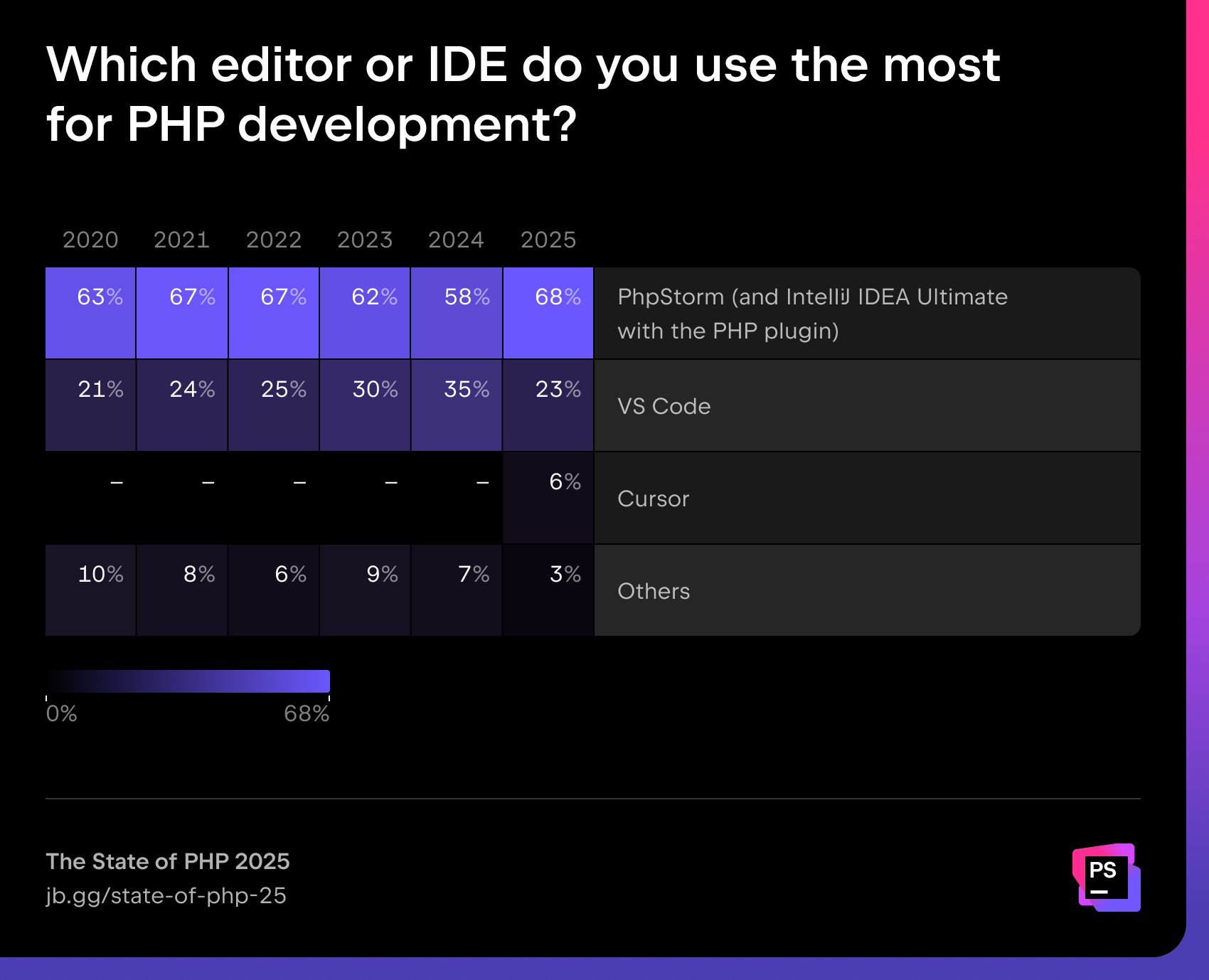
Satisfaction with coding tools
We also asked PHP developers how satisfied they are with their primary IDE. Among them, 53% of PhpStorm users gave their IDE the highest possible rating, compared to just 26% of VS Code users.
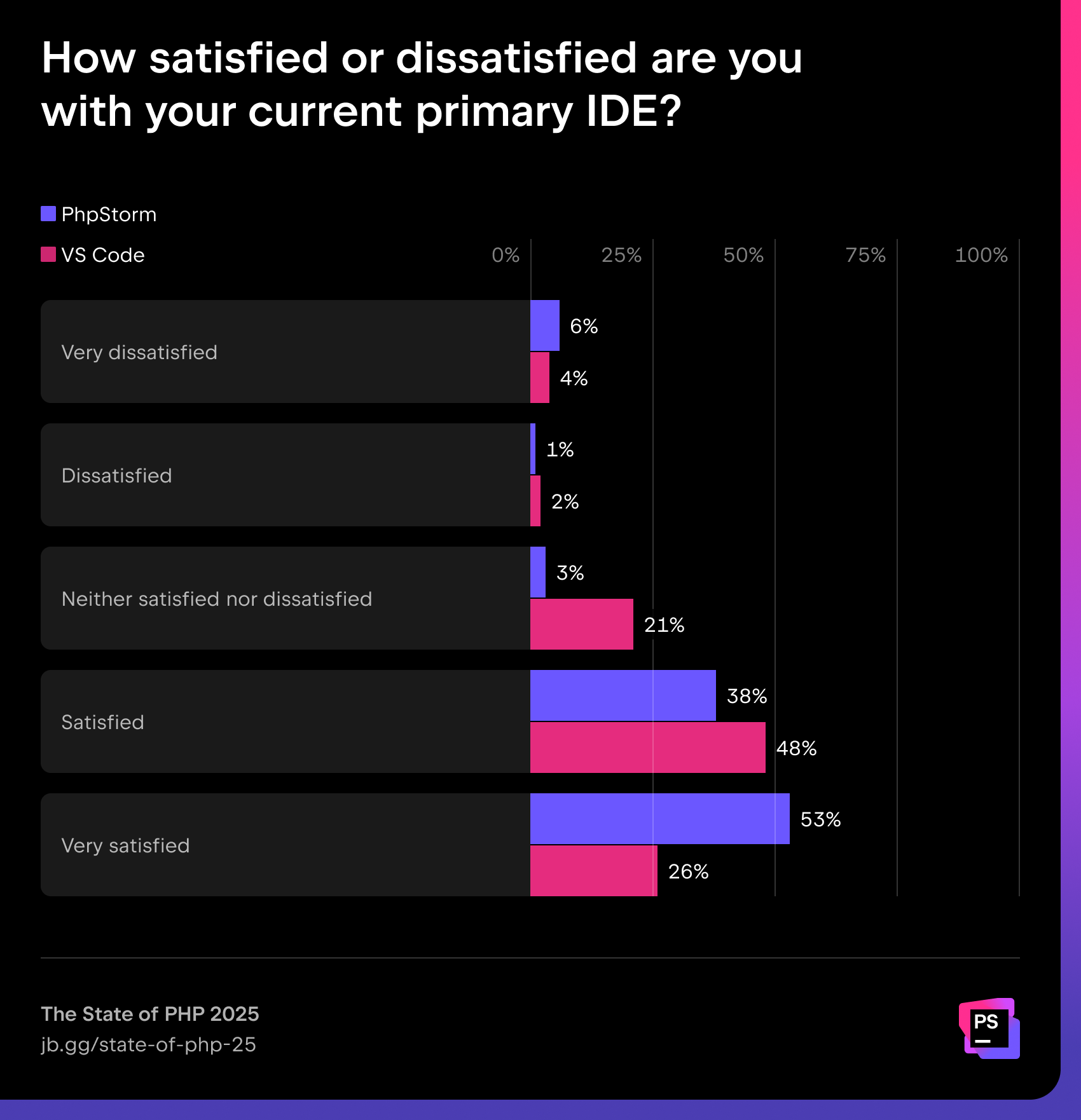
IDE or editor of choice per framework
PhpStorm dominates in Symfony (83%) and leads in Laravel (62%), while WordPress developers remain more split, with VS Code remaining a popular choice (37%).
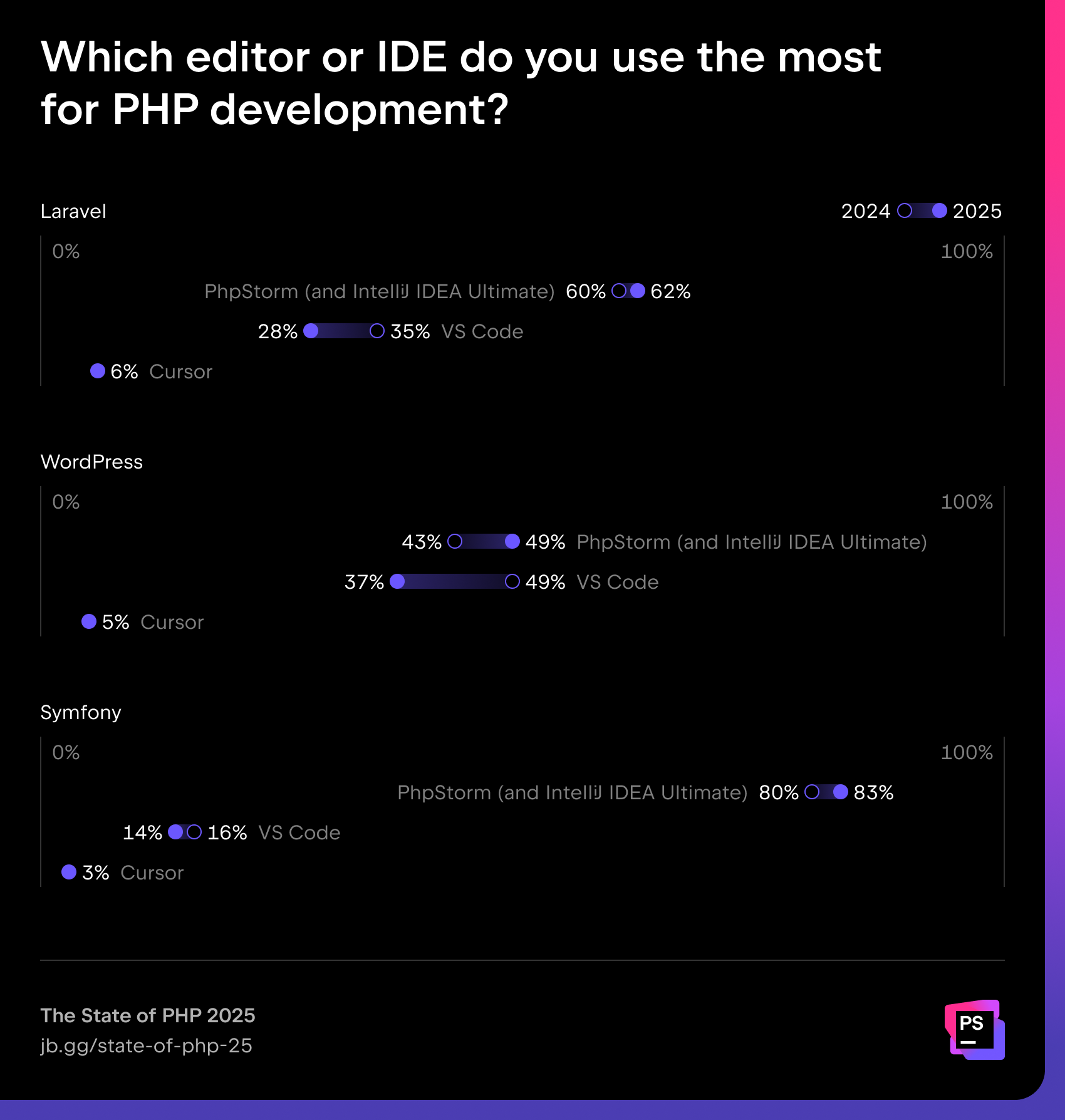
Did you know Laravel support is now free for all PhpStorm users? This blog post has the full story.
Debugging and testing
When it comes to debugging, most developers still rely on var_dump-style approaches (59%), though debugger adoption (e.g. Xdebug) has risen slightly to 39%.
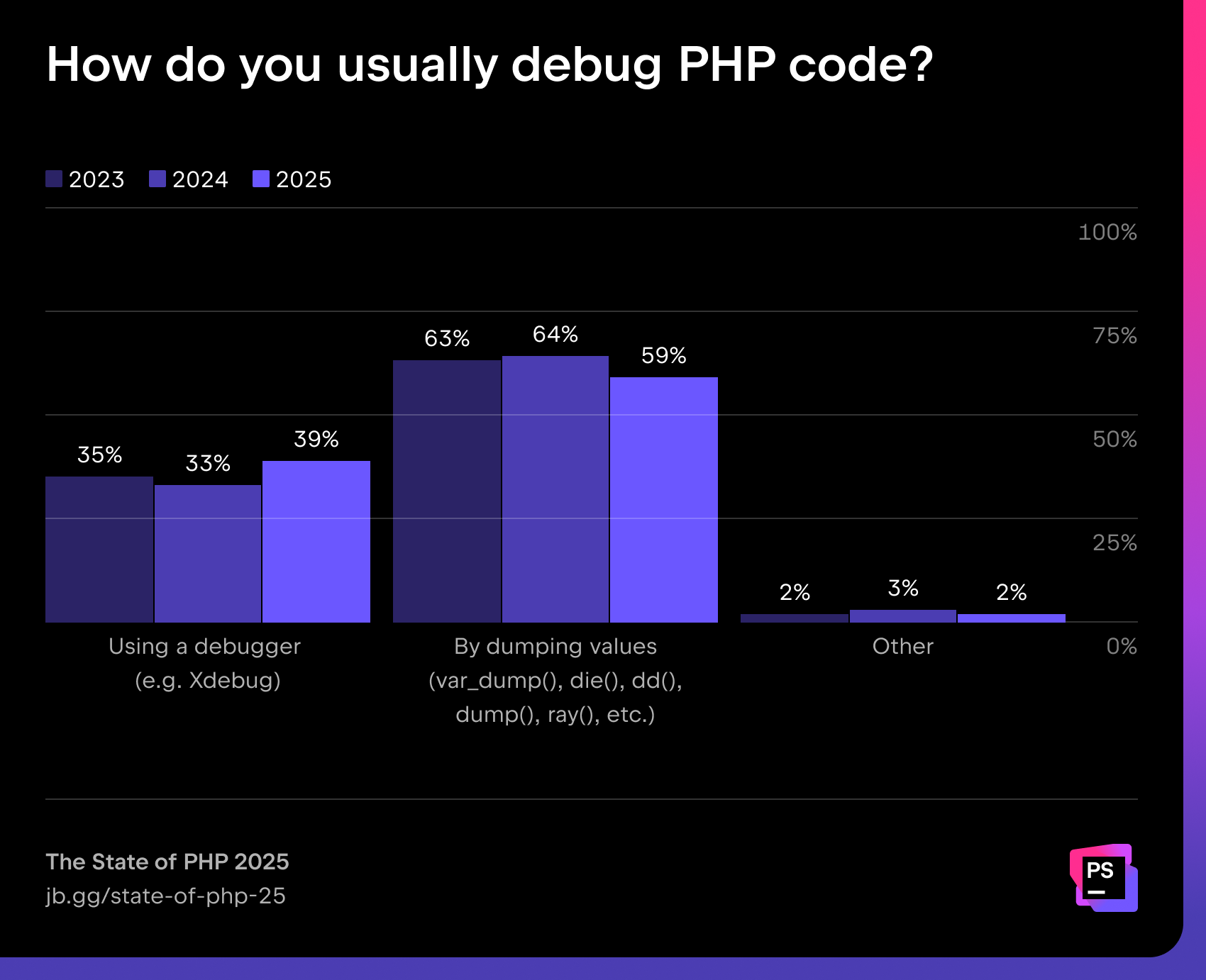
“Xdebug’s usage seems to be pretty stable throughout the years and across several surveys: between 30% and 35%. While I definitely still do my fair share of “dd” or “log” debugging, there are times where having a debugger at hand and knowing how to use it saves so much time. It’s a skill that takes practicing and doesn’t come overnight – which is why I made this short video to help folks get started with Xdebug.”
PHPUnit (50%) remains the standard, but Pest adoption has gained four percentage points to reach 17%, showing momentum toward modern, developer-friendly testing frameworks.
“I’m super-happy to see more and more people choosing Pest as their go-to testing framework – the growth in this year’s survey really reflects the quality of our recent releases.
Since the survey, we’ve actually released Pest 4, which introduces test sharding, profanity checking, and the revolutionary browser testing. Having proper browser testing in the PHP world is truly a game-changer, so I expect adoption to increase even more next year!”
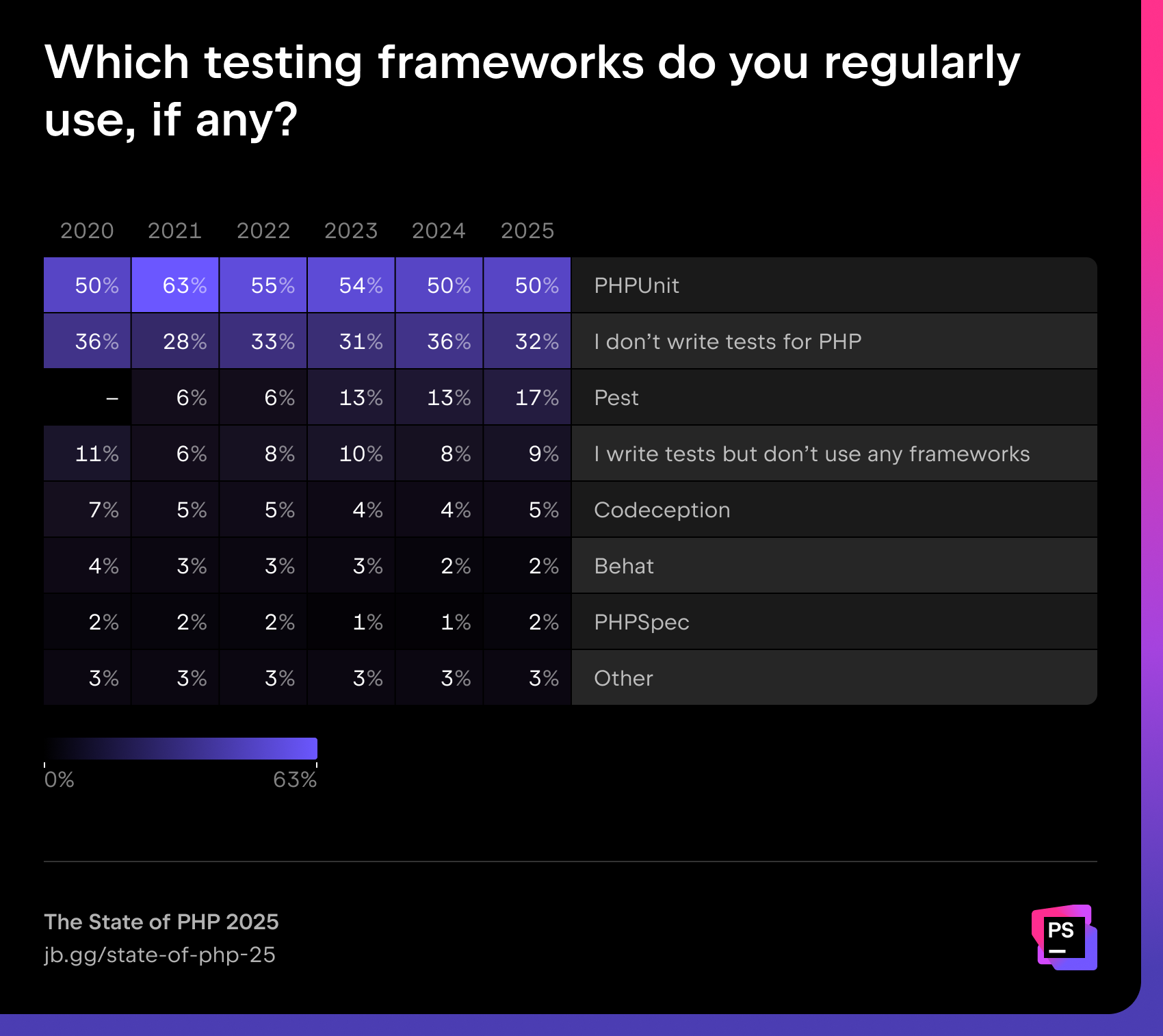
However, 32% of developers still don’t write tests at all, which highlights a persistent gap in testing culture.
Code quality tools
The clear winner in 2025 is PHPStan, which jumped to 36% usage, up nine percentage points from last year. Tools like PHP CS Fixer (30%) and PHP_CodeSniffer (22%) remain widely used, while Rector (10%) continues its steady rise. Still, 42% of respondents don’t use any code quality tools regularly, leaving room for further improvement.
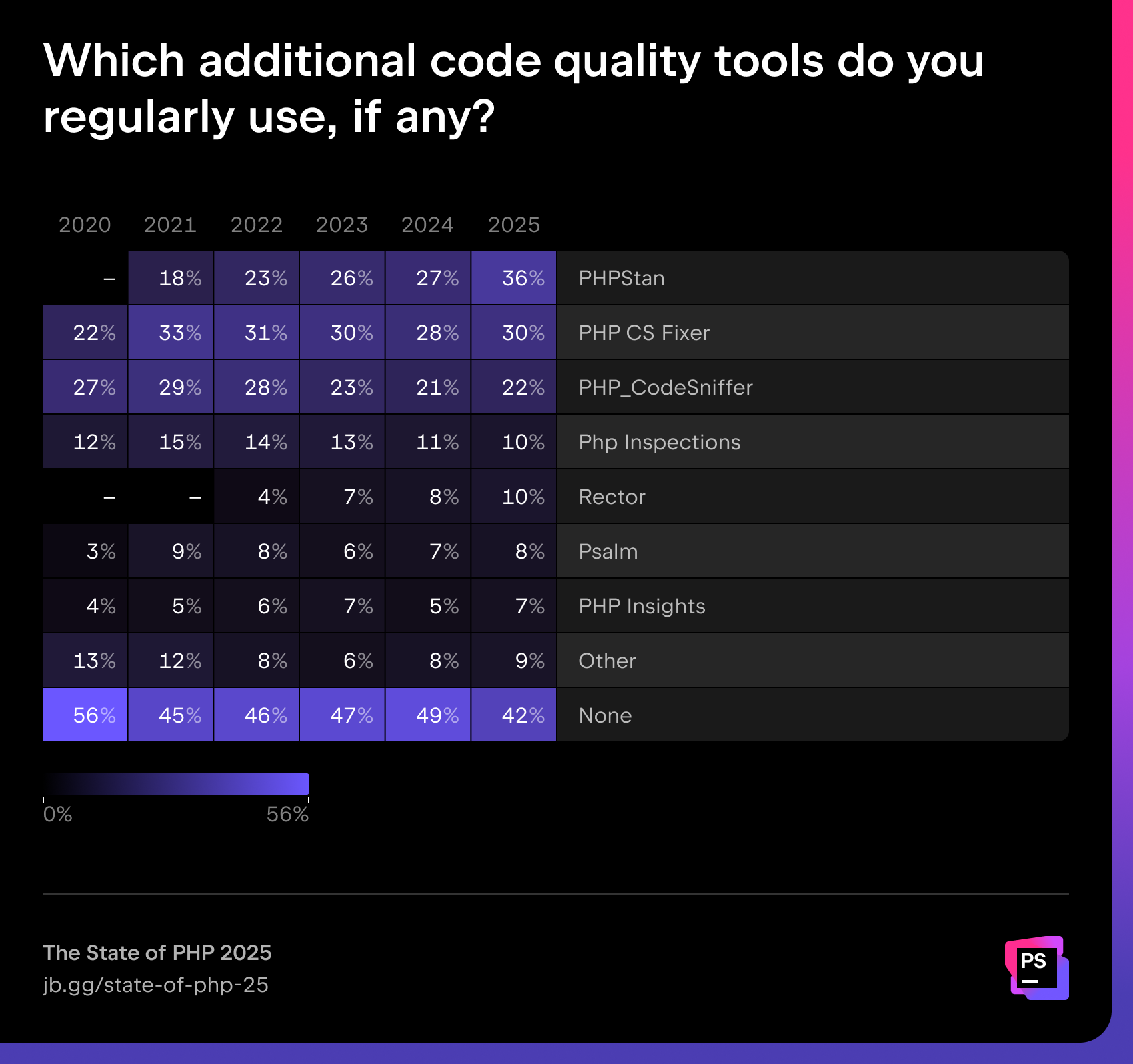
| ?Have you tried JetBrains Qodana? This static analysis and codebase auditing tool brings inspections from PhpStorm into your CI/CD pipeline, along with unique and custom code-quality and security checks. Use it to clean up and secure your team’s code before merging to the main branch. |
Adoption of AI
AI has gone mainstream: 95% of developers have tried at least one AI tool, and 80% regularly use AI assistants or AI-powered editors.
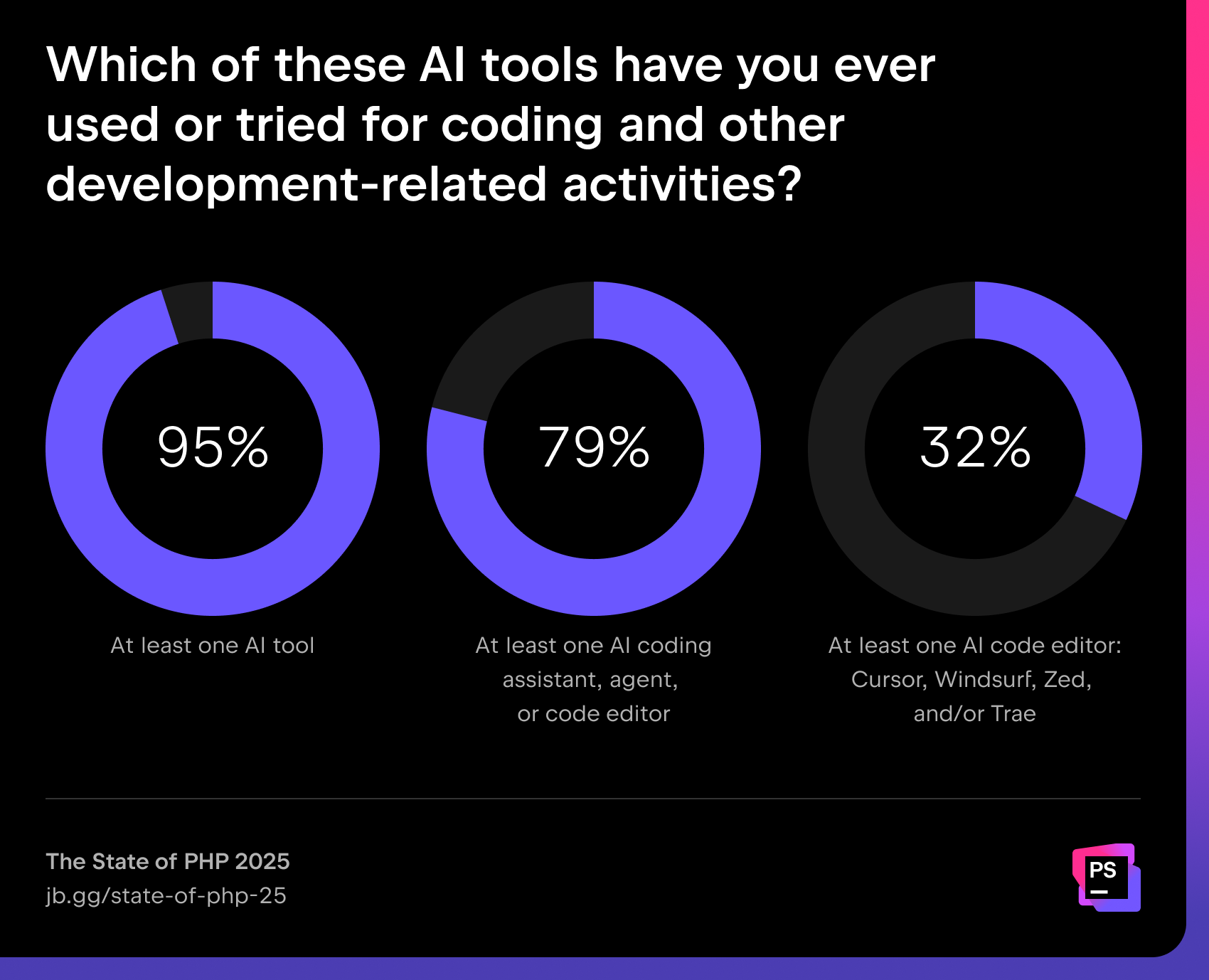
ChatGPT leads daily use with 49%, though its share has dropped since 2024. GitHub Copilot (29%) and JetBrains AI Assistant (20%) follow, with the latter tripling its adoption since last year.
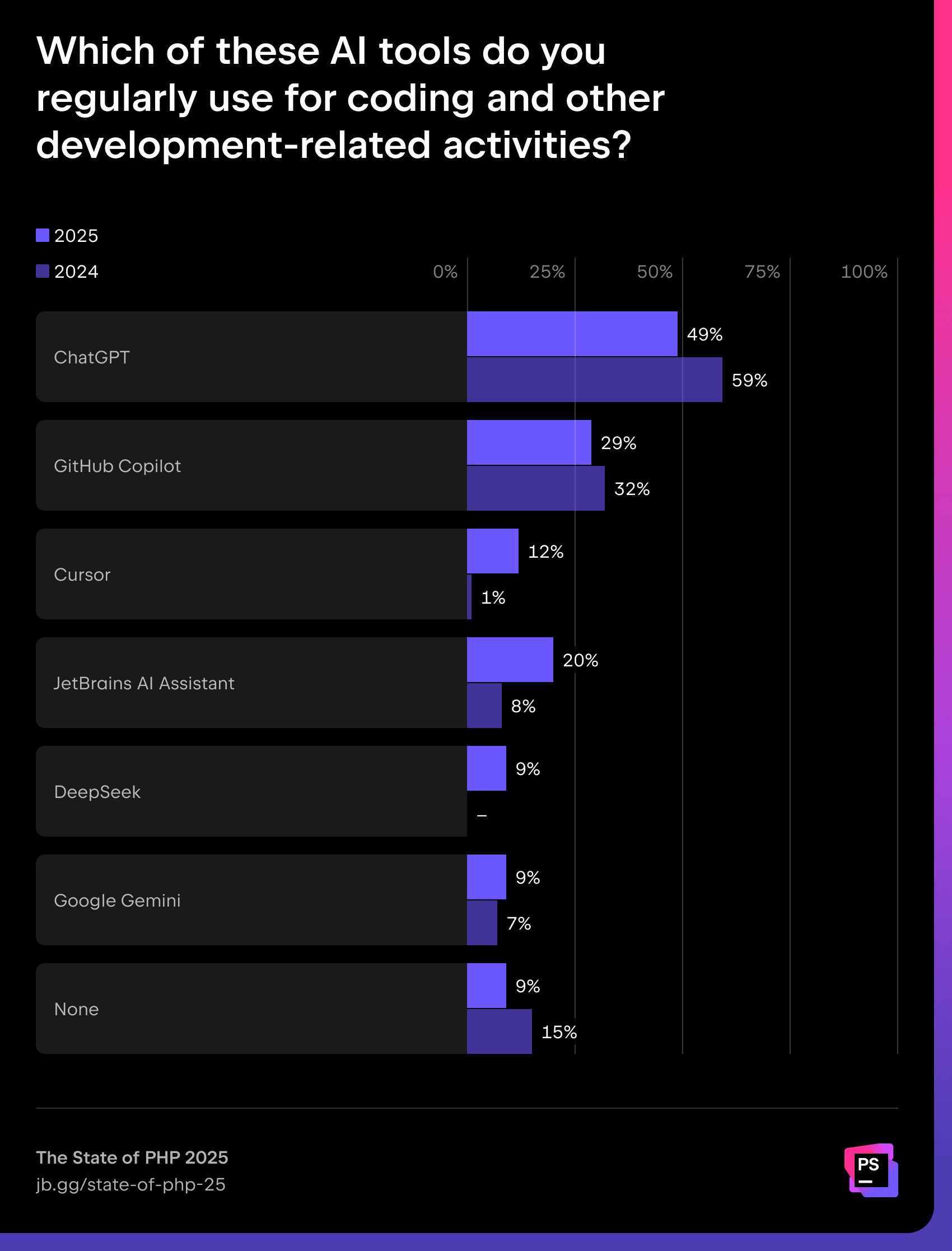
“AI is here to stay. It’s great to see the increased adoption of AI overall, and the drop in ChatGPT usage in favor of more specialized tooling. We can expect more of this moving forward, with new tools entering the scene, and the ones giving us the best boost earning their place in our daily stack.”
Looking ahead, 72% of respondents are likely to try AI coding agents in the next year, while only 8% say it’s unlikely.
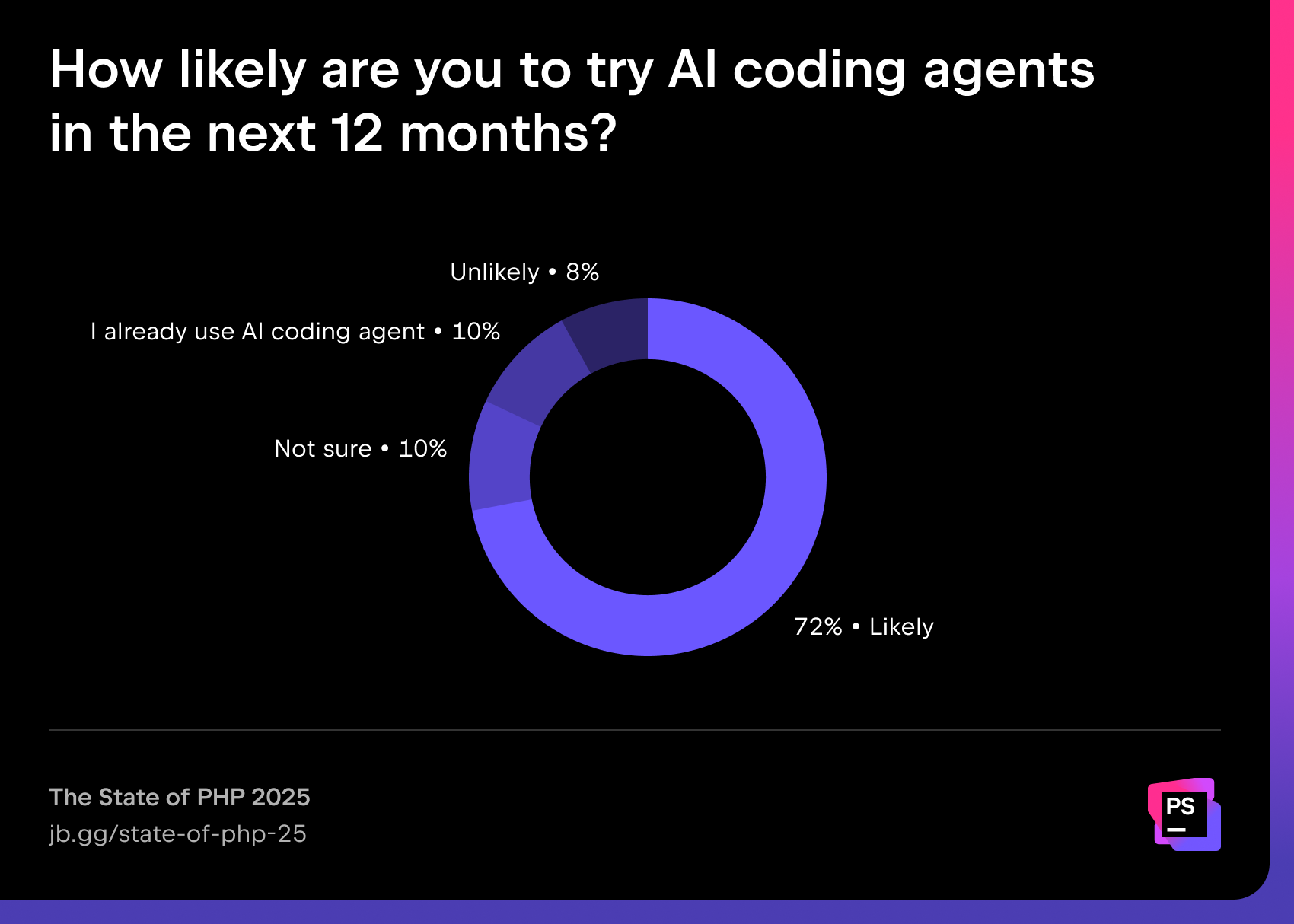
To support developers in this shift, earlier this year JetBrains introduced an AI coding agent called Junie. Unlike other coding assistants, Junie is built to work directly with your JetBrains IDE, project context, and team practices, delivering actionable and trustworthy support. With AI agents rapidly becoming part of everyday workflows, Junie brings the reliability, integration, and developer focus you expect from JetBrains to this new wave of tools.
At the same time, not every company is ready to embrace AI yet. 11% respondents report that their organization is unlikely to try AI coding agents in the next 12 months. Apart from the data privacy and security concerns (44%) and intellectual property questions (24%), many companies also struggle with a lack of knowledge about such tools (22%).
Ecosystem highlights 2025
FrankenPHP
“One of my personal highlights in PHP this year is FrankenPHP becoming a project backed by the PHP Foundation. I think there’s a lot of potential for the project to become the de-facto standard runtime for PHP, which would be huge. FrankenPHP has a lot of performance optimizations that work out of the box for any PHP application, it’s portable across systems, and it has worker mode, which allows for asynchronous request handling in PHP, which can speed up applications by a factor of three compared to using PHP FPM.”
Learn more about FrankenPHP from Kévin Dunglas on PHPverse 2025:
PHPverse
This year also marked a special milestone – PHP turned 30 years old. We celebrated with JetBrains PHPverse, an online birthday event that drew more than 26,000 viewers worldwide. If you missed it, don’t worry – the recordings are available to watch on demand:
Catch the next edition of PHPverse – sign up here to be the first to know when registration opens.
What this means for PHP
The 2025 results confirm that PHP remains a stable, professional, and evolving ecosystem. Its strong developer base, continued dominance of Laravel and WordPress, increasing adoption of modern tooling, and rapid embrace of AI-powered workflows show that PHP is far from being “legacy”.
Disclaimer: Despite all the measures we’ve taken to secure a representative pool of respondents, these results might be slightly skewed toward users of JetBrains products, as they might have been more likely to take the survey. Read more about our methodology.
Subscribe to PhpStorm Blog updates






